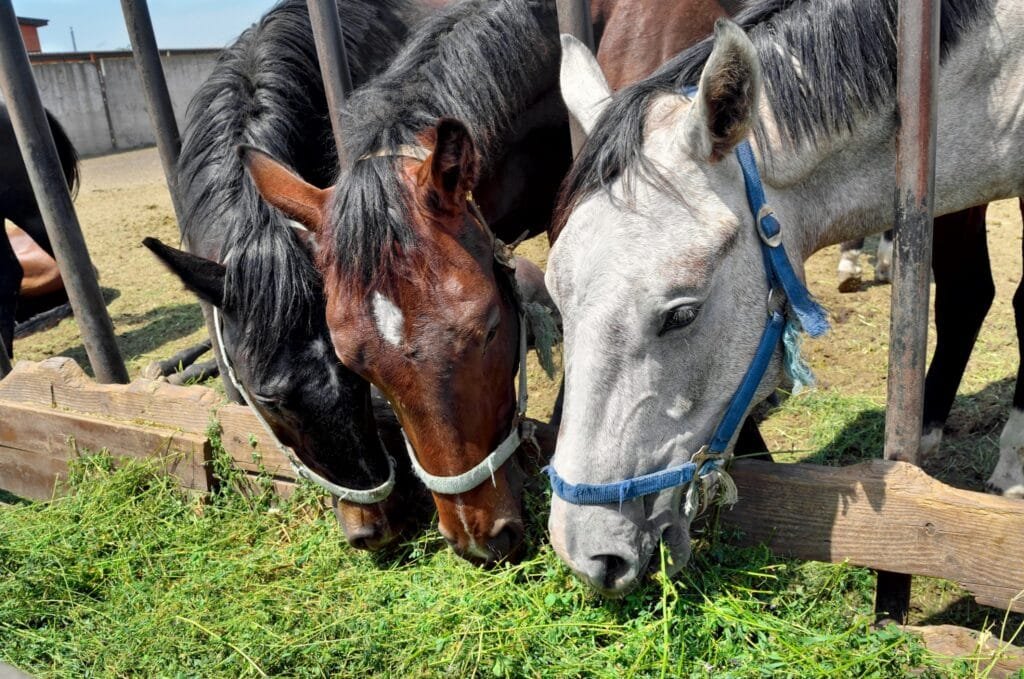Feeding your horse properly is key to ensuring its health, energy, and overall well-being.
Horses have specific nutritional needs that should be met consistently.Here are 10 essential rules to follow when feeding your horse:
1. Provide Clean, Fresh Water at All Times
Water is the most important part of your horse’s diet. Always ensure your horse has access to clean, fresh water throughout the day. Dehydration can lead to serious health issues, so make water readily available, especially after exercise or during hot weather.
2. Feed High-Quality Hay as the Base of Their Diet
Hay should make up the majority of a horse’s diet. Grass hay, such as timothy, meadow, or orchard hay, provides the necessary fiber for proper digestion. Ensure the hay is free from mold, dust, and contaminants. The fiber in hay helps maintain gut health and promotes natural chewing behavior.
3. Provide Grain Only When Necessary
Grain (such as oats or commercial feed) should be fed in moderation and only when your horse’s activity level or specific nutritional needs require it. Horses that are working hard or need to gain weight may require grain, but most horses can thrive on hay alone. Always consult a vet or nutritionist before adding grain to your horse’s diet.
4. Feed Small, Frequent Meals
Horses are natural grazers, and their digestive systems are designed to process small amounts of food throughout the day. If feeding grain or supplements, divide it into two or three small meals instead of one large serving. This mimics natural grazing and helps prevent digestive problems like colic.
5. Avoid Sudden Dietary Changes
Horses have sensitive digestive systems, so any sudden changes in their diet can lead to gastrointestinal upset. If you need to switch hay or grain types, do so gradually over a period of 7-10 days to allow their digestive system to adjust.
6. Monitor Their Weight and Body Condition
Regularly check your horse’s weight and body condition to ensure they are receiving the right amount of food. A healthy horse should have a moderate body condition score, where their ribs are not visible but can be felt easily. Adjust their diet if needed, based on their activity level, age, and health status.
7. Limit Treats and Sugary Snacks
While horses love treats, it’s important to limit sugary snacks such as carrots, apples, or commercial horse treats. Too many treats can lead to weight gain, metabolic problems, or colic. Offer treats in moderation, and always ensure they are horse-safe foods.
8. Ensure Proper Feeding Equipment
Make sure you have clean, safe feeding equipment. Use a good-quality feed bucket, manger, or haynet, and avoid any tools that could harm your horse. Always keep their feeding area clean to prevent contamination or the growth of mold.
9. Supplement Diet as Needed
While a balanced diet of hay and grain often meets most horses’ nutritional needs, certain horses may benefit from supplements. Horses with special dietary needs, such as older horses, horses in heavy work, or those with specific health issues, may require additional vitamins, minerals, or joint supplements. Always consult a vet before adding supplements.
10. Ensure Proper Feeding Equipment
To avoid digestive upset or colic, never feed your horse immediately before or after exercise. It’s best to wait at least 30 minutes to an hour after exercise before offering grain or hay. This gives the digestive system time to stabilize before consuming food.




